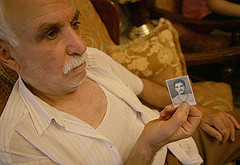A dual Australian Lebanese citizen faces the death penalty in Lebanon, charged with sedition and treason. Each charge has a death penalty. He was found running a sweatshop producing weapons, with some 500kgs on hand at the time of discovery. Two other Australians were also arrested with the Al Quaeda linked group.

Aussie terror suspect faces death in Lebanon
ReplyDeleteBy Martin Chulov
FORMER Sydney man Omar al-Hadba faces the death penalty in Lebanon after prosecutors sent his case to the nation's highest court, accusing him of playing a key role in a 13-week-long al-Qaeda revolt.
The case against Mr Hadba, arrested in early July along with four other Australians, has been transferred to the Council of Justice, which deals with crimes against the state. He is expected to be charged with either treason or sedition, both of which carry the death sentence.
The dual Australian-Lebanese national is accused of supplying weapons to leaders of the revolt at the Nahr al-Barad Palestinian refugee camp, 15km north of Tripoli. A Jihadi group emulating al-Qaeda, known as Fatah al-Islam, launched the revolt in mid-May.
In the operation to arrest the Australians, the army seized about 500kg of weapons from Mr Hadba's workshop in Tripoli.
The swoop netted two other Australians, who are also under arrest, former Sydney financial planner Ibrahim Sabbough and Sydney businessman Hussein Elomar.
Two further Australians - Mr Elomar's Australian boxing champion nephew, Ahmed Elomar, and Mohammed Bassel - were freed without charge after being detained for more than a week.
The Council of Justice is also expected to hear the cases of Mr Sabbough and Mr Elomar, but the investigating judge in the case and military intelligence officers are known to view Mr Hadba as a more significant security threat.
Army officers say enough weapons were found in his workshop to supply almost a company of regular soldiers.
Mr Hadba, who drove a taxi in Tripoli, has been repeatedly pressed about the origin of the weapons, which include Kalashnikov and M-16 assault rifles, rocket-propelled grenades, mines, sniper rifles, machine guns and hand grenades.
However, Lebanese authorities have been unsatisfied with the answers he has given them.
Lebanon claims to have 64 Fatah al-Islam members in custody and to have 50 more surrounded in Nahr al-Barad.
The remaining militants are holed up in a 1.5kmsq area at the centre of the camp, where they continue to mount attacks from a tunnel network underneath the ruins.
Snipers, booby traps and weeks of heavy combat have killed 137 Lebanese soldiers and an estimated 90 militants, the bulk of whom are believed to have fought with the Iraqi insurgency, beforearriving in Lebanon to take part in the revolt.
Fatah al-Islam has said it aims to overthrow the Government of Lebanese Prime Minister Fouad Siniora and to help introduce an Islamic caliphate across the Arab world.
Identity papers found on fighters captured or killed during the campaign reveal the insurgency has been fuelled by men from across Arabia and Europe, with at least one Danish national under arrest.
Rogue elements of Syria's intelligence apparatus are suspected of facilitating the fighting, with a view to toppling the Siniora Government and reasserting Syrian hegemony in Lebanon. The Syrian army was forced to pull out of Lebanon more than two years ago in the furore following the assassination on the Beirut waterfront of former prime minister Rafik Hariri. Syria continually denies any involvement in the murder.
Australian authorities are yet to be given access to the three detained nationals. However, Australian Federal Police and ASIO officers are closely monitoring developments.
The Australian embassy has repeatedly warned Lebanese military intelligence chiefs not to torture Australians to gain confessions.
After his release, Ahmed Elomar displayed bruises and abrasions on his torso, which he said were caused by torture during his interrogation.
Chessboard serial killer murdered for fun
ReplyDeletefrom news.com.au
A SERIAL killer charted his crimes on a chessboard, attaching a number and a coin to each square every time he struck.
By the time he was caught, Alexander Pichushkin, 33, had filled in 62 of the 64 squares.
He will face a jury trial next month accused of 49 of the murders because prosecutors could not find enough evidence to charge him over the other 13.
Most of the victims were men whom Pichushkin lured to Bittsa Park in southwest Moscow with the promise of a drink.
More than 40 died after he threw them into a sewage pit when they were too drunk to resist. The rest he killed with a hammer.
In an interview, Pichushkin bragged about his passion for killing.
"For me, a life without murder is like a life without food for you," he said.
"I felt like the father of all these people, since it was I who opened the door for them to another world."
The killings began in 2001. Pichushkin was arrested in June 2006 after police found his name and phone number on a piece of paper that a woman who was killed in the park had left for her son.
He went on to confess to at least 62 murders and led police to the bodies of many of his victims, investigators said.
Police found his chessboard with a number and a coin attached to each square, chief investigator in the case, Andrei Suprunenko, said.
Shortly after the arrest, police invited Russian television to film and broadcast him in an effort to counter media speculation that he had been forced into making false confessions.
Pichushkin said on TV that he had killed his first victim, a classmate, in 1992 when he was 18. Police had questioned him then but no charges were filed.
"My client understands that he is to blame for most of these murders," Pichushkin's lawyer said outside court yesterday.
Pichushkin scowled as he was brought into Moscow City Court for the preliminary appearance at which he opted to be tried by a jury instead of a panel of judges.